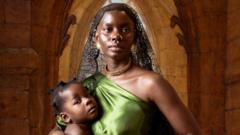Dola Posh embodies multiple identities: photographer, mother, Nigerian, and Briton. However, following the birth of her daughter, Dola found herself grappling with a profound loss of identity. Just six days postpartum, she was secluded in a hospital bed amid a COVID-19 lockdown, questioning her future behind the camera she once cherished. The absence of family support during an already isolating time exacerbated her anxiety, as her mother remained thousands of miles away in Nigeria, where Dola had lived before moving to the UK.
Caught in an emotional whirlwind, Dola reflected on her sense of self. "I thought: ‘I’m me; the baby’s out, I’m still me.’ But no, I wasn’t me any more," she recalled, encapsulating the feelings many mothers fear to voice. Postnatal depression is a common yet often unrecognized presence, particularly among Black women, and Dola was not immune to its grasp.
Once she returned home, Dola faced an influx of unsolicited parenting advice that only heightened her feelings of inadequacy. "I wasn’t given the chance to be a mother,” she remarked, revealing the pressure she felt to conform to external expectations. Throughout 2020, Dola fought through sleepless nights, isolation, and numbing monotony until a dark voice urged her towards a devastating path.
Amidst her despair, she reached out for help, calling her health visitor during a particularly dark night. That moment became a turning point, leading her to therapy, where she was encouraged to use photography as an emotional outlet. Dola's roots in photography, enriched during her studies in marine biology in Nigeria, allowed her to document not only the faces of others but her own experiences as a new mother.
In an intimate project, Dola started taking self-portraits with her daughter, Monioluwa. With themes echoing the Madonna and child in Western art, these images visually articulated her struggle and reconnection to her identity. The act of photographing herself in the presence of her baby signified a reclamation of support and love she longed for, resonating with her cultural upbringing in a religious Nigerian household.
Over time, sharing her journey transformed her narrative. By openly discussing the challenges of motherhood and postnatal depression, Dola dismantled the veil of shame surrounding mental health discussions. Her recent accolade from Leica enables her to expand her work and engage other Black mothers, emphasizing a crucial need for visibility in health narratives.
“I want a world where black mothers don’t have to carry so much burden,” she stated, expressing a desire for representation within the media. Dola’s mission extends beyond artistry; it seeks to create a community where women feel seen and supported, inspiring future generations of artists and mothers alike to share their profound stories. In her words, it's vital that women stand up and declare: “I am still an artist, I am still a woman and I have something to say.”




















